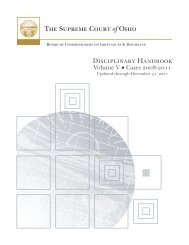The Supreme Court Ohio Annual Report
The Supreme Court Ohio Annual Report
The Supreme Court Ohio Annual Report
You also want an ePaper? Increase the reach of your titles
YUMPU automatically turns print PDFs into web optimized ePapers that Google loves.
Journalist Tony Mauro speaks about the impact<br />
of the appointment of Justice Sonia Sotomayor<br />
to the U.S. <strong>Supreme</strong> <strong>Court</strong> during the October<br />
Forum on the Law event.<br />
decidedly away from the mysterious and<br />
closed practices that characterized the <strong>Court</strong><br />
for more than 200 years toward a more open<br />
and accessible approach to the public. He<br />
speculated that the addition of the latest<br />
<strong>Supreme</strong> <strong>Court</strong> Justice, the Honorable Sonia<br />
Sotomayor, will accelerate the change.<br />
Mauro, who has covered the U.S. <strong>Supreme</strong><br />
<strong>Court</strong> for 30 years, said while some have<br />
predicted that Justice Sotomayor likely will<br />
not affect the court dramatically because she<br />
will follow the general judicial philosophy<br />
of her predecessor, Justice David Souter,<br />
he believes Sotomayor’s different life<br />
experiences will have a major impact.<br />
“<strong>The</strong>re is considerable evidence that<br />
she will go her own way,” he said, noting<br />
her professional experience as a judge, a<br />
federal prosecutor and a private attorney.<br />
“She is Hispanic, and English is not her first<br />
language. She grew up in the Bronx, has<br />
diabetes, and goes to karaoke bars. In other<br />
words, she is a far cry from David Souter,<br />
an almost hermit-like Yankee from New<br />
Hampshire.”<br />
While it remains to be seen how Justice<br />
Sotomayor’s jurisprudence will differ from<br />
Justice Souter’s, Mauro said it is clear that her<br />
approach to the question of openness and<br />
accessibility will be much different.<br />
Mauro noted that Justice Souter once<br />
remarked that cameras would be allowed<br />
in the U.S. <strong>Supreme</strong> <strong>Court</strong> “over my dead<br />
body,” and was famous for rejecting almost all<br />
media requests, even once politely rejecting a<br />
request by Mauro for an interview about the<br />
Boston Red Sox.<br />
By contrast, Mauro said Sotomayor granted<br />
a television interview her first week on the<br />
bench in which she told of crying when<br />
she received the phone call from President<br />
Barack Obama asking her to accept his<br />
nomination to the court.<br />
Other changes at the <strong>Court</strong> are bringing<br />
more openness and accessibility too, Mauro<br />
said.<br />
All the sitting justices recently granted<br />
television interviews to C-SPAN for a<br />
documentary series on the <strong>Court</strong>; Justices<br />
Antonin Scalia and Clarence Thomas went<br />
on recent book tours; and Chief Justice John<br />
Roberts allowed for the same-day release of<br />
oral argument transcripts.<br />
17

















